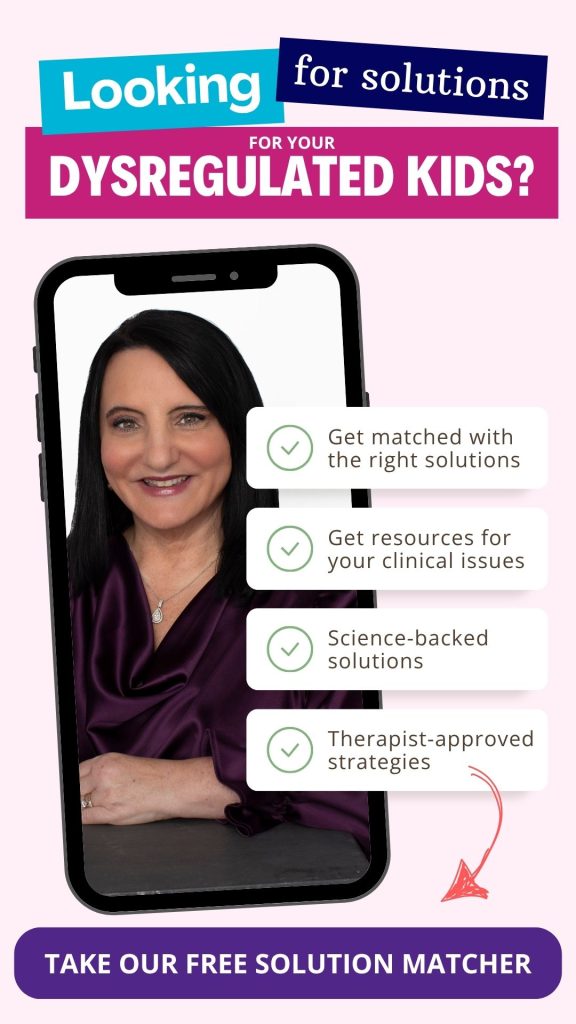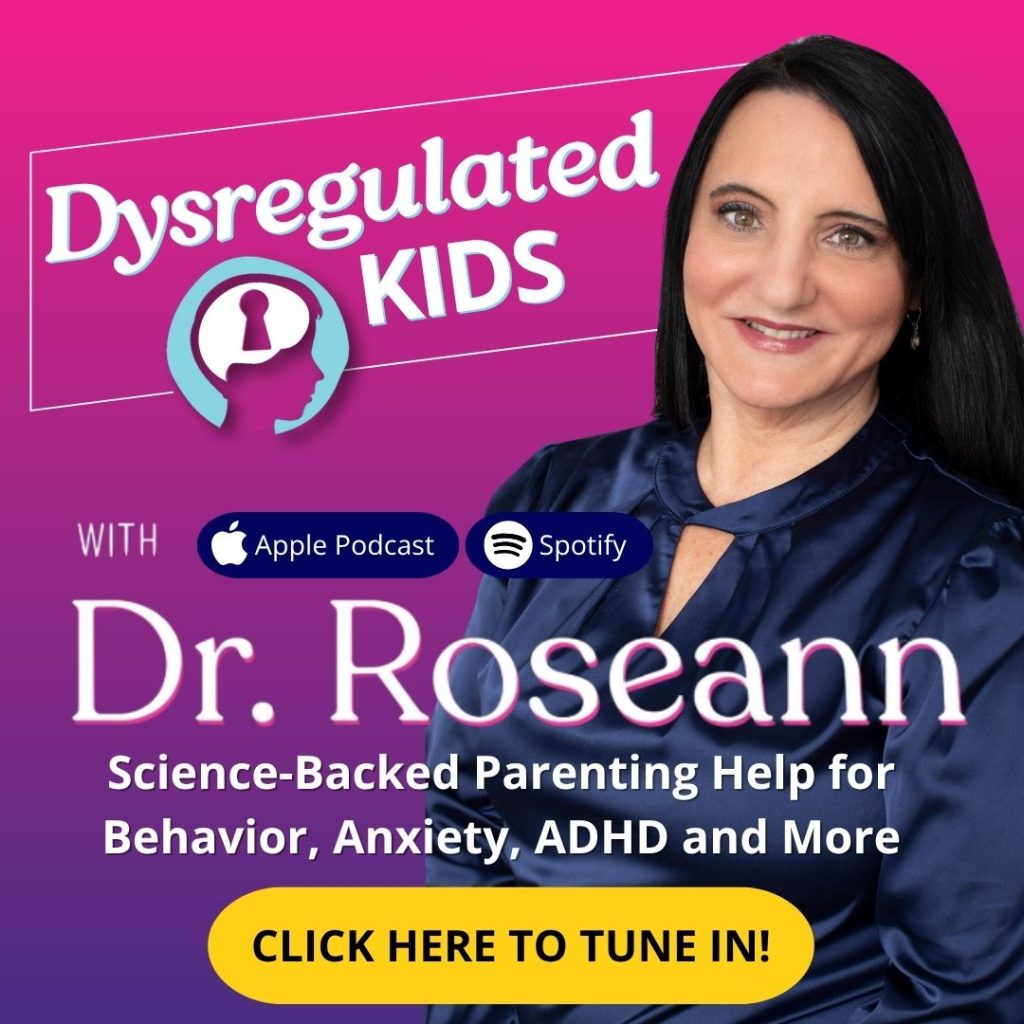If mornings at your house feel like a scene out of Groundhog Day—lost shoes, forgotten homework, and meltdowns over the simplest requests—you’re not alone. These daily struggles aren’t about your child being lazy or difficult; they’re signs of executive functioning skills that are still developing.
The good news is that these skills can be strengthened, especially when we calm the brain first. In this guide, I’ll walk you through 37 powerful, practical ways to help your child build focus, organization, and persistence—so mornings (and the rest of the day) can feel a whole lot smoother.
What Are Executive Functioning Issues?
Executive functioning refers to the brain’s “CEO skills”. These are planning, prioritizing, time management, working memory, and emotional control.
When a child has executive functioning issues, they struggle. They have difficulty organizing their thoughts and following through on daily responsibilities.
Common signs include:
- Trouble starting homework without reminders
- Difficulty remembering multi-step directions
- Emotional meltdowns when routines change
- Constantly losing belongings
- Appearing “lazy” but really feeling overwhelmed
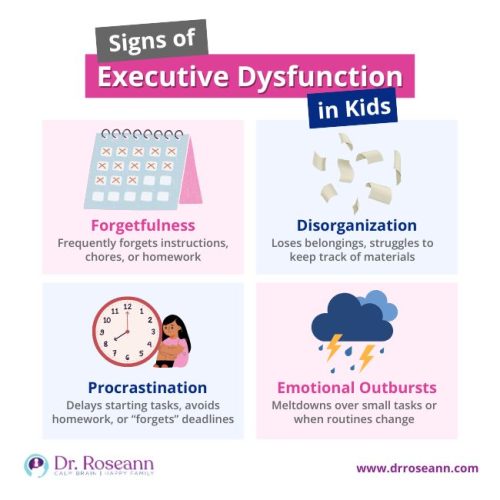
Causes of Executive Functioning Problems in Kids
Executive functioning struggles can be linked to several conditions:
- ADHD
- Anxiety
- Autism Spectrum Disorder
- Concussion or brain injury
- Depression and mood disorders
- OCD
- PANS/PANDAS
- Sensory processing disorder
Research shows that response inhibition (the ability to “put the brakes on”) is at the core of many of these challenges (Barkley, 2012). When kids can’t control impulses, everything from learning to friendships gets harder.
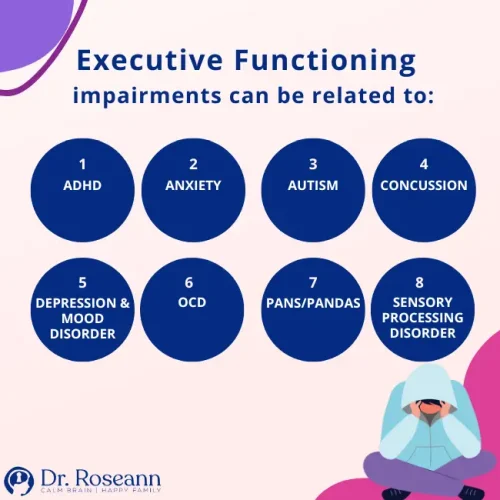
Can executive functioning skills be taught?
Yes! These skills don’t always come naturally to kids with ADHD or dysregulated brains. But they can be explicitly taught and practiced.
Parent reassurance: If your child seems years behind their peers, it’s not because you failed. This is because their brain wiring requires more support. With the right strategies, children can develop and strengthen these skills, ultimately achieving success and thriving.
37 Ways to Improve Executive Functioning Skills
Here are 37 practical strategies you can start using today. Each one builds independence, reduces family stress, and teaches kids the brain skills they need for life.
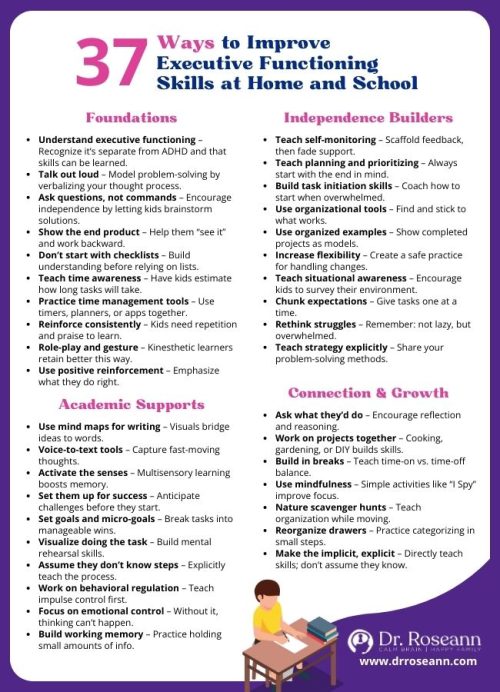
How Can Parents Support Kids Without Spoon-Feeding
You don’t want to micromanage, but you also can’t just let your child fail. The key is coaching, not rescuing.
- Coach, don’t rescue. Give support at first, then fade it gradually.
- Model metacognition. Talk out loud as you plan, so your child hears problem-solving in action.
- Celebrate small wins. Every micro-goal achieved builds confidence and regulation.
Read more about: Children’s Executive Functioning: Hidden Keys to Calm and Success
Want more help for your child to strengthen executive functioning? You can book a 1-on-1 program with me through my BrainBehaviorReset Program.
FAQs about Executive Functioning Issues
At what age do executive functioning issues show up?
Early signs often appear in preschool—difficulty with transitions, impulse control, and emotional regulation. By grade school, problems with organization and time management become clearer.
Can executive functioning issues improve without medication?
Yes. Some kids do well with medication. But calming the brain with strategies, coaching, and neurofeedback can make a big difference, too.
Do all kids with ADHD have executive dysfunction?
Yes, but not all kids with executive dysfunction have ADHD. Other conditions, like anxiety or concussion, can also impair these skills.
Hope for Parents Navigating Executive Functioning Issues
Parenting a child with executive functioning issues can feel exhausting and overwhelming. But you are not alone.
The good news is that these skills aren’t fixed. They can be taught, practiced, and strengthened over time.
When you calm and regulate the brain first, your child can begin to learn planning, organization, and emotional control. Breaking the process into small steps and celebrating wins builds confidence and independence.
Remember, behavior is communication, not defiance. With the right support, your child can grow, thrive, and discover their own strengths.
Terminology
- Executive Functioning: The brain’s self-management system, including planning, working memory, and emotional control.
- Response Inhibition: The ability to stop and think before acting.
- Metacognition: Thinking about thinking—reflecting on how you plan, organize, and solve problems.
Citations
Barkley, R. A. (2012). Executive functions: What they are, how they work, and why they evolved. Guilford Press. https://www.guilford.com/books/Executive-Functions/Russell-Barkley/9781462545933
Zelazo, P. D., & Carlson, S. M. (2012). Hot and cool executive function in childhood and adolescence: Development and plasticity. Child Development Perspectives, 6(4), 354–360. https://doi.org/10.1111/j.1750-8606.2012.00246.x
Best, J. R., & Miller, P. H. (2010). A developmental perspective on executive function. Child Development, 81(6), 1641–1660. https://doi.org/10.1111/j.1467-8624.2010.01499.x
Always remember… “Calm Brain, Happy Family™”
Disclaimer: This article is not intended to give health advice, and it is recommended to consult with a physician before beginning any new wellness regimen. The effectiveness of diagnosis and treatment varies by patient and condition. Dr. Roseann Capanna-Hodge, LLC, does not guarantee specific results.
Are you looking for SOLUTIONS for your struggling child or teen?
Dr. Roseann and her team are all about science-backed solutions, so you are in the right place!
©Roseann Capanna-Hodge




